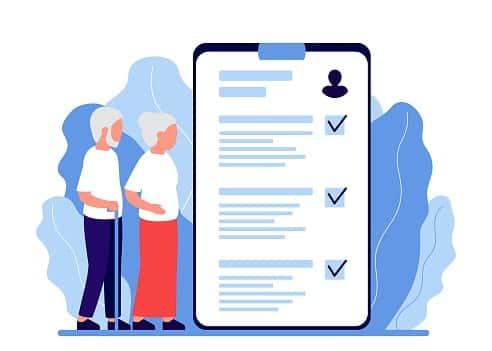Common reasons for health insurance claim denials
When insurance refuses to pay a claim, there may be several reasons:
- A provider or facility isn’t in the health plan’s network.
- A provider or facility didn’t submit the right information to the insurer.
- The health plan needed more information to pay for the services.
- The health plan didn’t deem a procedure medically necessary.
- A clerical error.
Cheryl Fish-Parcham, director of access initiatives at Families USA, a nonprofit that advocates for accessible, affordable health care, says a clerical error is often to blame.
"A large group of claims is denied based on billing or coding errors that the doctor's office can readily straighten out," she says.
Fish-Parcham adds that you can dispute denied claims that the insurer alleges aren't covered by the policy.
"People should look to see what the plan documents actually say about whether a benefit is covered and get help from their insurance department or an expert consumer assistance program if there is any doubt," says Fish-Parcham.
The claims denial rate for health insurance varies. A Harmony Healthcare study found that claim denial is on the rise in hospitals, averaging between 6 and 13%. Meanwhile, a Kaiser Family Foundation analysis found that health insurance marketplace plan denials are even more frequent at 18%.
How to appeal an insurance company decision
Fighting a health insurance company over a claim denial might sound like a David vs. Goliath struggle, but the battle is worth waging if you've got a legitimate case. Plus, winning is easier than you might think.
Many wrongful claim denials stem from coding errors, missing information, oversights, or misunderstandings. An insurance denial appeal can resolve many issues quickly.
Pat Jolley, director of clinical initiatives at the Patient Advocate Foundation, says that your insurance company will send you a denial letter outlining why when a claim is denied. The denial letter will provide the appeals process and the deadline to appeal.
How long does an insurance appeal take?
A typical health insurance appeal could take as long as two months. If you’re waiting for treatment, an insurer typically decides on the appeal within a month. If you’ve already received the treatment and got billed, the insurance company may take two months. Health insurance companies have policies that influence the time they must decide on an appeal. If time is of the essence, you can request an expedited appeal process, which could take up to three days.
What to do if a health insurance claim is denied
So your doctor ordered a test or treatment and your health insurance claim denied it. What now? How do you dispute a health insurance claim denial? Check out the steps below to learn how to fight a health insurance claim denial:
1. Find out why the health insurance claim was denied.
The insurance company should send you an explanation of benefits form that states how much the insurer paid or why it denied the claim.
Call the insurer if you don't understand the explanation, says Katalin Goencz, director of MedBillsAssist, a claims assistance company in Stamford, Connecticut.
If it's a simple error, the insurer might offer to straighten it out. But double-check to make sure your insurer follows through, Goencz says.
"Get the name of the person you spoke to, the date, the reference number for the phone call and put it on your calendar to check back with the company in 30 days," she says.
2. Read your health insurance policy.
Understand exactly what’s covered under your policy and how co-pays are handled. Health insurance plans differ.
For example, find out if you have an HMO or a PPO. Usually, the health insurer includes a summary of benefits online, but you should read the policy itself, says Rebecca Stephenson, president and CEO of VersaClaim, a claims assistance and patient advocacy business in Austin, Texas.
"This is not a document you store in the attic with your old tax records," she says. "It needs to be close at hand."
Can't find it? Ask your employer’s benefits department, health insurance company or your broker, depending on how you get insurance, for a copy.
3. Learn the deadlines for appealing your health insurance claim denial.
Read your health plan and understand the rules for filing an appeal.
"You want to know how under the gun you are," Stephenson says.
If it's a complex case and you're concerned about meeting the deadline, send a letter stating you're appealing the denial and will send further information later, Stephenson says.
4. Make your case.
Gather necessary documents from your healthcare provider.
"Get a letter of medical necessity from your healthcare provider that outlines why the recommended treatment you received was medically necessary," Jolley says.
In cases in which you're denied because the service or treatment you received wasn't covered, provide peer-reviewed medical studies to support your case that the service was medically necessary. If you initially got a second opinion and the provider recommended the same treatment, use it as evidence for your appeal.
If you need additional evidence, Fish-Parcham says "consumers can reach out to professional societies or disease associations to gather additional information about why and when a particular type of treatment is considered medically necessary and is a best practice."
Sometimes, the problem stems from something as simple as a billing mistake by a doctor's office.
Stephenson tells of one client whose health insurance company denied a claim for surgery because her deviated septum was named as the diagnosis. The insurer didn't cover surgeries for a deviated septum.
But she was also diagnosed with acute purulent sinusitis -- the real reason for the surgery, which was never communicated to the insurance company.
Stephenson had the client submit copies of her medical reports, X-rays, and a physician's letter confirming the sinusitis diagnosis. The patient won.
5. Write a concise appeal letter.
When you write a health insurance appeal letter, be sure to include your address, name, insurance identification number, date of birth for the person whose claim was denied, date the services were provided and the health insurance claim number, Goencz says.
"The first sentence should state that you are appealing the claim denial, and the body of the letter should explain why the medical bills should be paid," Goencz says. "Put in a closing sentence demanding payment, and include supporting documentation."
Include details on what you're appealing and why you feel your claim should be paid.
"You need to appeal based on the reason that something has been denied. So, if something has been denied because it's not a covered service, then saying that something is medically necessary doesn't count," Jolley says.
Save emotional rants for understanding friends. Stick to the facts.
"[Insurers] don't want to know about your grief and how sick you've been," Stephenson says.
Send by certified mail to get a notification that the packet was received, she adds.
Here's what you can submit:
- Your letter of medical necessity
- A copy of your denial letter
- Other supporting documents by the deadline
Track everything so you have proof of when you submitted your appeal. Save all electronic communications and write down the names and dates of anyone you speak with.
6. Follow up if you don't hear back.
Follow up with your insurance company 7 to 10 days after you submit your appeal to make sure it’s received, Jolley says.
Once you submit an appeal to your insurer, another medical professional, who didn't initially review your claim, will check all the information for your appeal. Jolley says you can request a board-certified reviewer in the medical specialty associated with the claim.
The time it takes for your insurer to review your appeal varies. It could be as quickly as 72 hours. It could take 60 days. The timing depends on the insurer’s policies.
Once your insurer makes a decision, you'll receive a notification in writing, which will include details on:
- Why your appeal was approved or denied
- The basis of the decision
- The next step in the appeals process
"Every level of appeal that you go through, you'll get an actual denial or approval letter from the insurance company, and on the denial letter it tells you exactly what your next step is and the next level of appeal you go to," Jolley says.
There are at least two or three levels of internal review you can go through with your insurance company before you can seek external review, Jolly says.
7. If you lose, be persistent.
Once an external review is completed, you'll receive a letter saying your denial rights have been exhausted. After this, you may have the option to pursue the matter through your state's insurance commission or to file an appeal in federal court if you have an Employee Retirement Income Security Act (ERISA) health plan.
If your appeal gets denied, figure out why the health insurer rejected the appeal. "What other information do you need to give them to state your case?" Stephenson says.
Then, follow the health plan's procedures for filing a second appeal.
If you exhaust the appeal process and are still unsatisfied, you can take the case to the state department of insurance, unless your coverage is through an employer that is self-insured. In that case, your next stop is the U.S. Department of Labor, although both Goencz and Stephenson say getting federal officials to act is a long shot.
If you need additional help, some states have consumer assistance programs to help navigate the appeals process. Fish-Parcham says the "explanation of benefits" in your plan summary may list the names of these programs. If you have an employer-sponsored plan, talk to your HR department about whether patient navigator programs can help with the appeals process.
Overwhelmed? Hire a professional patient advocate, health insurance lawyer or claims assistant. You can get names of claims assistance professionals in your area through the Alliance of Claims Assistance Professionals.
What is a prior authorization?
An insurer may decline you even before a test or procedure through the prior authorization process. Health insurers created the prior authorization process as a way to limit care that it deems unnecessary.
With prior authorization, your healthcare provider must get the insurer's approval. For example, your doctor may want to perform an MRI if she spots a mass on one of your organs. However, your health plan may want to review your medical records before it approves the request. They do this to make sure an MRI is necessary for your specific case.
Some studies and surveys have indicated that prior authorization may affect patient care. In one survey, 93% of radiation oncologists said PAs delay patient care. One-third of them also said they decided on different treatment for 10% of patients because of these delays. However, health plans argue differently. They point to studies that indicate up to 30% of medical care is unnecessary and that physicians sometimes prescribe the wrong treatment.
Cathryn Donaldson, a spokesperson for America's Health Insurance Plans, says prior authorization isn't meant to hinder patient care.
"Just like doctors use scientific evidence to determine the safest, most-effective treatments, health insurance providers rely on data and evidence to understand what tools, treatments and technologies best improve patient health," Donaldson says.
Health insurers are collaborating with physicians, hospitals, medical groups and other care providers to improve prior authorization. Donaldson says AHIP and these groups "are committed to timeliness. In fact, most prior authorizations are approved within 72 hours for urgent care and under two weeks for non-urgent care."
How to appeal a prior authorization denial
You have several options if your insurer denies prior authorization.
"You can gather more medical evidence and appeal -- first informally, and then following the formal procedures outlined in the notices you get from your insurance plan," Fish-Parcham says. "Before filing the formal appeal, take enough time to understand the reasons for denial and gather evidence to refute those reasons. But don't hesitate to work with your doctor or other provider to informally push the plan to reexamine the decision."
If you submit all this evidence and your insurer still rejects your appeal, you can do several things. You can file a lawsuit against your insurer, but that approach is incredibly costly and lengthy. A better option may be to go through your state's appeals process.
Most states allow consumers to request an independent review of their claim. During this process, an independent doctor will review the insurance company's decision and come to a final decision about your claim. Check with your state's department of insurance to find out when you can ask for an external review. In Massachusetts, for example, you can request an external review up to four months after you receive a letter from your insurance company denying your appeal.
As a consumer, it's important to understand the appeal and review process after a claim denial. Jolley says all consumers should know that they have a right to appeal. Studies have shown appeals are often more successful than not.
The Advisory Board’s Hospital Revenue Benchmark Study found that between 29-59% of appeals to commercial insurance companies are successful. So if you receive a denial letter from your insurer company, it doesn't hurt to take the time to contest it.
Health insurance finder tool

COBRA
Learn more about COBRA
How much is your annual household income?
How many members are in your household?
Medicare
Medicare costs vary depending on which option you choose.
Learn more about Medicare costs.
Medicaid

Parent's employer-sponsored health insurance

Spouse's employer-sponsored health insurance

Employer-sponsored health insurance

Preferred-provider Organization (PPOs)
Preferred-provider organization (PPOs) plans are the most common type of
employer-based health plan. PPOs have higher premiums than HMOs and HDHPs, but
those added costs offer you flexibility. A PPO allows you to get care anywhere
and without primary care provider referrals. You may have to pay more to get
out-of-network care, but a PPO will pick up a portion of the costs.
Find out more about the differences between plansHealth maintenance organization (HMO)
Health maintenance organization (HMO) plans have lower premiums than PPOs.
However, HMOs have more restrictions. HMOs don't allow you to get care outside
of your provider network. If you get out-of-network care, you'll likely have to
pay for all of it. HMOs also require you to get primary care provider referrals
to see specialists.
Find out more about the differences between plansHigh-deductible health plans (HDHPs)
High-deductible health plans (HDHPs) have become more common as employers look
to reduce their health costs. HDHPs have lower premiums than PPOs and HMOs, but
much higher deductibles. A deductible is what you have to pay for health care
services before your health plan chips in money. Once you reach your deductible,
the health plan pays a portion and you pay your share, which is called
coinsurance.
Find out more about the differences between plansExclusive provider organization (EPO)
Exclusive provider organization (EPO) plans offer the flexibility of a PPO with
the restricted network found in an HMO. EPOs don't require that members get a
referral to see a specialist. In that way, it's similar to a PPO. However, an
EPO requires in-network care, which is like an HMO.
Find out more about the differences between plans
Learn more about individual insurance plans
Frequently asked questions
What's the difference between denied claims vs. rejected claims?
The phrases are similar, but there is a difference between denied health claims and rejected claims.
A denied claim is often a claim with an error or one that violates the health plan’s fine print. For instance, a denied claim may happen if the provider didn’t get the required prior authorization for a treatment or the plan doesn’t cover the service. The insurance payer may reverse the denial if the provider offers the needed paperwork and documentation.
A rejected claim is usually connected to a provider’s office entering incorrect billing codes in the claim. Billing errors are a fairly common reason for rejected claims. A provider can resubmit with the correct information to rectify the issue.
What to do if your health insurance claim gets denied for a second time
If you appeal a health claim twice, you may be able to request an independent review or go to your state’s insurance department, depending on the health insurer’s policies.
Health insurance companies usually perform an internal review in the first appeal. If you appeal the decision, the insurance company may perform a second internal appeal review or ask an independent third-party expert to perform a second review.
If that rejection is upheld another time, you can contact your state’s insurance department and request help. The state may review your appeal and work with the insurance company to resolve the issue.
What is an expedited appeal?
An expedited appeal is a faster process than a normal health insurance claim rejection appeal.
Health plans, including Medicare Advantage, Medicare Part D and Affordable Care Act marketplace plans, allow expedited appeals when a normal appeals process could cause harm to the person’s health. A regular appeal process may take a month, but expedited appeals usually take less than three days.
If you need an expedited appeal, the provider should check the claim appeal form for an option to expedite your appeal and explain why you need a quick review of the appeal.
What should be done when insurance denies a procedure and says it wasn't medically necessary?
If the health insurance company has a claim denied as not medically necessary, you should contact your doctor and ask them to write a letter or contact the insurance company about why the treatment is medically necessary.
For instance, if you’re not sure what to do when your insurance denies surgery, start with proving medical necessity.












